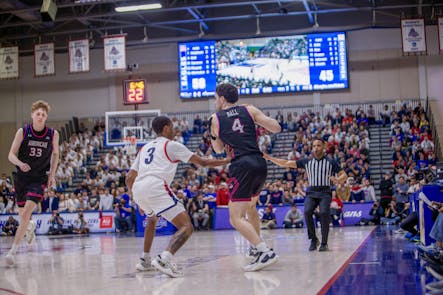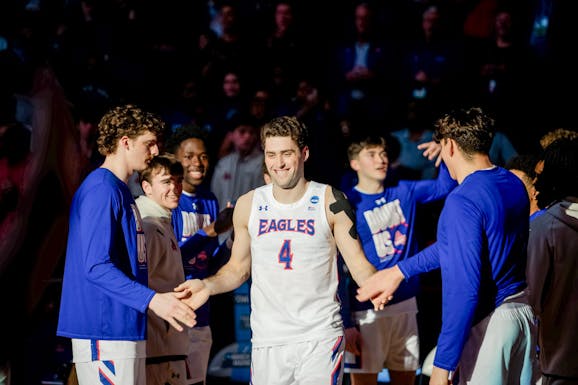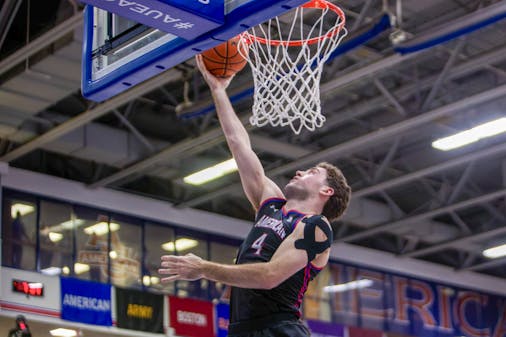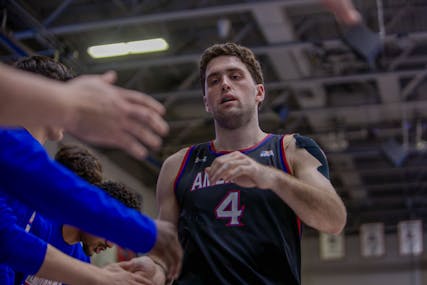Before the buzzer-beater, before the sold-out crowds at Bender Arena, before the championship run to March Madness, Lincoln Ball made a choice to do whatever it took to help his team win.
Over five years and three head coaches, and through uncertainty and a global pandemic, Ball became the kind of player that every program hopes for: one who leaves it better than he found it. Ask anyone — teammates, coaches, faculty, fans — and they’ll tell you the same thing: Lincoln Ball is irreplaceable.
Ball started his collegiate career at George Washington University, where COVID-19 cut his freshman season short. In a time filled with uncertainty, Ball found certainty in one place: American University.
Recruited by Eddie Jackson, who was an assistant coach at AU under former head coach Mike Brennan, Ball took a leap of faith and transferred across town to American University.
Ball was also convinced to join the Eagles by his former hometown rival turned longtime teammate, graduate forward Matt Rogers.The two had played together in fifth grade, faced off throughout middle and high school and spent three years on the same Amateur Athletic Union team. When Ball was ready for a change, Rogers encouraged him to come to AU and team up once again.
Ball moved just 3.7 miles to his new home, but staying in D.C. was an intentional choice. As a native of Williamsport, Maryland, he saw D.C. and AU as the perfect middle ground, close enough for his family to attend every game, but far enough to grow on his own.
However, the move to American wasn’t the perfect transition Ball had hoped for, specifically on the court. His sophomore and junior seasons were quiet — defined by his search for how to best fit within the team.
“The first three years weren’t ideal, or what I expected them to be. There’s definitely good moments in those years. But I think they all really lead where I am now. I would do those three years again if I could have these last two years,” Ball said.
Then, Ball faced another uncertainty. Brennan parted ways with the Eagles in 2023, leaving the program without a head coach. A number of players considered transferring — and two key contributors ultimately did. But Ball never seriously entertained the idea of leaving.
“I thought, ‘You know what? I’m just going to have some blind faith and think that the grass can be green here,’” Ball said. “I looked at it as an opportunity to prove myself again. To get a new chance, a new opportunity.”
That new opportunity came with the arrival of head coach Duane Simpkins and his staff. From the start, they saw potential in Ball — not just as a role player, but as a leader. For the first time in his college career, Ball felt like things were finally starting to click.
“When Simpkins and his staff came here, they appreciated my commitment, drive and passion,” he said. “And they really pushed me into being confident and comfortable in my role.”
The coaching staff made it clear that this was a fresh start.
“We told him whatever role you were previously in — forget about that,” assistant coach Jackie Manuel said. “That’s no longer what we’re expecting. We started pouring into him to be confident as a basketball player.”
And Ball responded. As a senior and graduate student, he started every game, led the team in rebounding and embraced the role of a player who did all the little things that made a big difference — defending, passing, rebounding and bringing composure to the floor.

“You can bring that stuff every day. You can rebound, you can assist, you can play as hard as you possibly can every single time. So that was a choice. That is how I could impact the game,” Ball said.
“We rewarded him with playing time and more of it,” Manuel said. “We really tried to encourage that, especially in front of our team, to let everybody know how important it was.”
His teammates noticed, too.
“Having a team with five guys that want to score — that doesn’t work,” sophomore forward Greg Jones said. “All the other things matter too, even though you don’t get the spotlight for them. Having a guy that’s willing to give up his shots and do things that not everybody sees is so important.”
But every now and then, his team needed him to take the shot.
On Jan. 22, 2025, with American trailing Lehigh by 1 in the final seconds, Ball forced a jump ball to give the Eagles one last possession. The ball ended up in his hands again — this time on the elbow, pushing a one handed mid-range floater as the buzzer sounded. It connected. His teammates mobbed Ball. The crowd at Bender Arena erupted.
“His shot against Lehigh, just an unbelievable play, is unforgettable,” Manuel said. “He probably didn’t think he would ever be in that position to have an impact on the game that way. But he did.”
That shot against Lehigh was just one moment in a run that would define Ball’s final season. With Ball anchoring the defense, leading the team in rebounding and setting the tone with his energy and unselfish play, American fought through Patriot League play and earned a spot in the conference tournament final.
Despite playing during spring break when many American University students were away, the Patriot League Championship Game at Bender Arena sold out. It was the kind of stage Ball might’ve only dreamed of in his early college years, playing for a title, in a packed gym, with the AU community behind him.
“If you had asked me four years ago, I would have never told you that Bender would have been sold out for our games. All the support we got from the community has been just awesome,” Ball said.
On March 12, the Eagles defeated Navy to win the Patriot League Championship, punching their ticket to the NCAA Tournament for the first time since 2014. For Ball, it was the kind of ending most players only dream of — cutting down the nets with his teammates, hoisting a trophy and knowing they had made school history.
Even then, Ball deflected attention.

“It’s just been so fulfilling to see all the hard work that we put in come to fruition,” he said. “And to be recognized by the community and students — it means a lot.”
But Simpkins was more than willing to give Ball the credit he deserved.
“Linc is a winner,” Simpkins said. “He does a number of things you just don’t see on a stat sheet, and that’s what helps you win. Not just games, but championships.”
A week later, American men’s basketball made its first NCAA tournament appearance in over a decade, facing Mount St. Mary’s in the First Four. Despite a valiant effort, the Eagles fell to the Mountaineers, concluding their remarkable season and marking the end of Ball’s collegiate career.
“It’s been so much fun and so rewarding,” Ball said. “And we never did it for that satisfaction. We did it because we knew we could do it and wanted to do it. So that was just an extra added layer of happiness.”
For Ball, it wasn’t just about wins — it was about building something worth showing up for. And by the end of his career, the home court stands weren’t just full, the fans were following.
“We had 30 students come to Dayton, Ohio, on a bus for 16 hours,” Ball said. “That's the stuff you’ll never forget.”
Shane Gardner, a senior in the College of Arts and Sciences, and Ariel Plevan, a sophomore in the School of Public Affairs, rode that bus to Ohio.
“One thing I’ve noticed at AU games is when Lincoln goes up to get a rebound, the entire crowd cheers like he scored,” Gardner said. “I think that's really special, because we’re so used to depending on him for second-chance opportunities — it’s pretty much like he’s scored once he gets a rebound.” Plevan agreed.
“To replace him is going to be something that’s really hard to find,” Gardner added.
“I don’t think you can replace a guy like that,” Plevan echoed.
Ball’s legacy extended well beyond the stat sheet or the student section. Inside the locker room, he set a standard for his team as someone who led not just the words, but with accountability and care for the people around him.
“The first person he really took under his wing was Greg Jones,” Manuel said. “And Greg last year played exactly like that — when he got in the game, he was trying to make an impact: rebounding, defending, very similar to Lincoln.”
Ball saw that relationship the same way. When Jones arrived as a freshman, Ball was a senior, and the two quickly grew close. He said watching Jones grow over the past two years has been one of the most meaningful parts of his time at AU.
This year, that role shifted to freshman forward Julen Iturbe, who began to mirror Ball’s energy and effort on the court.
“Lincoln did a really good job of helping Julen improve — whether that was competing on the court, in film sessions or any opportunity he could,” Manuel said.
Jones, now a key piece of the team, credits Ball with shaping not only his game — but his confidence.
“I just watched him as a role model, and he would help me — and he believed in me. And I think him showing me that he believed in me made me a better player,” Jones said.
Ball didn’t see leadership as something transactional; it was about culture, connection and bringing everyone in.
Coaches pointed to his leadership not just in action, but in voice. He became the kind of player who could rally the group, hold teammates accountable and reset the tone when it mattered most.

“Lincoln was able to communicate, to get the team together or hold each other accountable,” Manuel said. “That made a big difference, because as a coach, you can only do it so much. When the players are leading the way, it sets your team apart — and Lincoln was able to do that for everybody.”
That leadership extended beyond practice. Whether it was after a tough game or draining practice, teammates leaned on Ball’s voice.
“One thing we’ll miss about him is his voice in the locker room,” Jones said. “Just hearing what he thinks — he’s someone everybody can lean on.”
Ball was more than a teammate; he was the guy who brought everyone together.
“He’s such a motivating presence for the whole team,” Jones said. “We’re going to miss that next year.”
His coaches echoed the sentiment.
“When you have good leaders, it goes beyond what they do on the court,” Manuel said. “You start looking at the intangibles, you start looking at their presence. He left such a tremendous legacy behind that I really hope the poise that he gave our team, that confidence, that the team can carry that on.”
Ball’s drive wasn’t only evident on the court. In the classroom, he approached his education with the same drive and focus.
“Academics have been very important to me, because I like to apply myself. I like to be challenged,” he said.
He’s currently finishing his master’s in marketing at the Kogod School of Business, which he’ll complete in June. For Ball, the academic experience at AU turned out to be just as meaningful as the athletic one.
“I couldn’t tell you how good this university and Kogod would be for me coming in,” he said. “But Dean [David] Marchick has been phenomenal. He has made Kogod such a pleasant and awesome place. The program and the people and the professors — they’re just phenomenal. I’m super thankful for AU and the academic side of it too. It ended up being an amazing opportunity.”
It’s a legacy that others on campus believe will carry far beyond AU.
“Lincoln is going to be incredibly successful in whatever he does in the future,” Marchick said. “He possesses a rare combination of intelligence, hard work, leadership and empathy. And that’s an unusual set of skills that will serve him well in the future.”

As for what’s next? Like many graduating students, Ball is in the midst of applying for jobs. His playing days are officially over — but he’s not ruling out staying close to the game.
“Coaching has been in the back of my mind for a while, and I’m not ruling that out,” he said. “I think I’m ready. I’m definitely gonna miss it. Maybe I’ll get that out of coaching.”
Those who’ve worked with him think it’s a natural fit.
“Yeah, absolutely — he’s a natural,” said Manuel. “Because it’s about motivating people and getting guys to believe in a common goal or something they didn’t believe they could do, and Lincoln did that. He did that for this group with his words and with his actions.”
Jones agrees. “He talks like a coach. He loves the team environment. He loves talking strategy. He loves the whole idea of the team. I think coaching is perfect for him. Honestly, I think he’ll definitely find somewhere to compete.”
Even as his time on the court comes to a close, Ball isn’t going far. He plans to stay near D.C., and his presence around the team won’t be going away anytime soon.
“He said he’s gonna come to as many games as possible,” Jones said. “So he’ll be over at our house and be here for games and practices — he’ll still be here.”
Because the truth is, Ball’s impact doesn’t end with a final buzzer or a last stat line. It lives on in the culture he helped build, the players he mentored and the standard he set for what it means to wear an AU jersey.
Once we start playing next season, you’ll see some parts of Lincoln out there within our guys,” Manuel said. “But to replace his impact is never going to happen. He left a tremendous legacy and a tremendous foundation for us to build upon.”
This article was edited by Jack Stashower, Penelope Jennings and Abigail Turner. Copy editing done by Olivia Citarella and Nicole Kariuki.





